 |
In the picture to the right it is 1972 and the new telescope
has arrived at Behlen Observatory. In the picture to the right Dr. Kam-Ching
Leung and Dr. Donald Taylor discuss the new telescope with patron Walter
Behlen (foreground). |
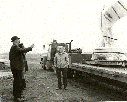 |
|
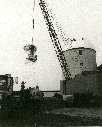 |
A crane was necessary to lift the base of the telescope into the dome through the very narrow slit. |
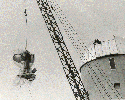 |
|
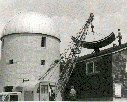 |
In the picture to the left the slit is being raised upon the roof of Behlen Observatory. The slit is the part
of the dome that slides up creating an opening when observing is done. |
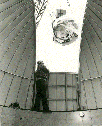 |
|
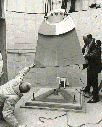 |
In the image to the left Don Fuehring and Don Taylor prepare to mount
the base of the telescope to the floor. In the image to the right the mounting
has been completed and Don Fuehring and Kam-Ching Leung take a break. |
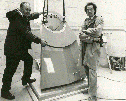 |
|
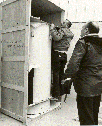 |
In the image to the left the telescope tube has arrived and is being unpacked.
In the image to the right one can see a much earlier photo of the assembled telescope at the Boller and Chivens factory.
A substantially discounted price was obtained on our telescope because the University of Washington purchased an identical
telescope at the same time. Their telescope seen behind ours was made in their school color of yellow. Should ours
have been husker red instead of the traditional blue and white Boller and Chiven color? |
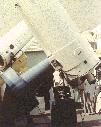 |
|
 |
In the image to the left the mirror blank was delivered to the optical
shop in Tucson, Arizona. The image to the right shows a close up view of
the 30-inch mirror blank. It is made of a type of ceramic material call
cer-vit. Even for extreme temperature variations from hot summers to cool
winters there is essentially no distortion of the mirror (the coefficient
of thermal expansion for cer-vit is much lower than that for pyrex, which
is commonly used for chemistry glassware and baking dishes). |
 |
|
 |
In the image to the left the polished mirror was installed at the base of the telescope tube assembly.
The right image shows a close up of the telscope tube assembly and the off-axis mount support. |
 |
|
 |
To the left is a picture of the telescope control panel. Astromers use coordinates called Right Ascension
and Declination to find locations in the sky that are analogous to longitude and latitude on the Earth. To the right
is the telescope key where one turns the telescope on. |
 |
|
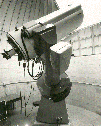 |
In the image to the left the 30-inch telescope is completely assembled. In the right image
one can see the control panel in the background. |
 |
|
 |
Former Observatory Director Kam-Ching Leung tries out the new telescope. |
 |



















